
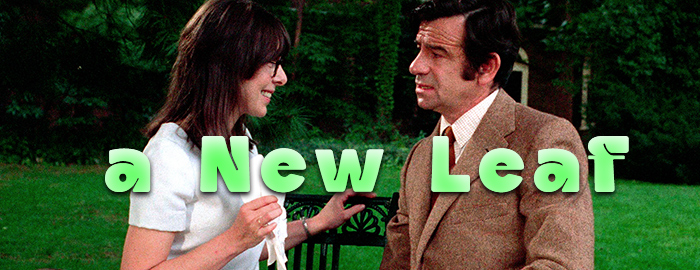
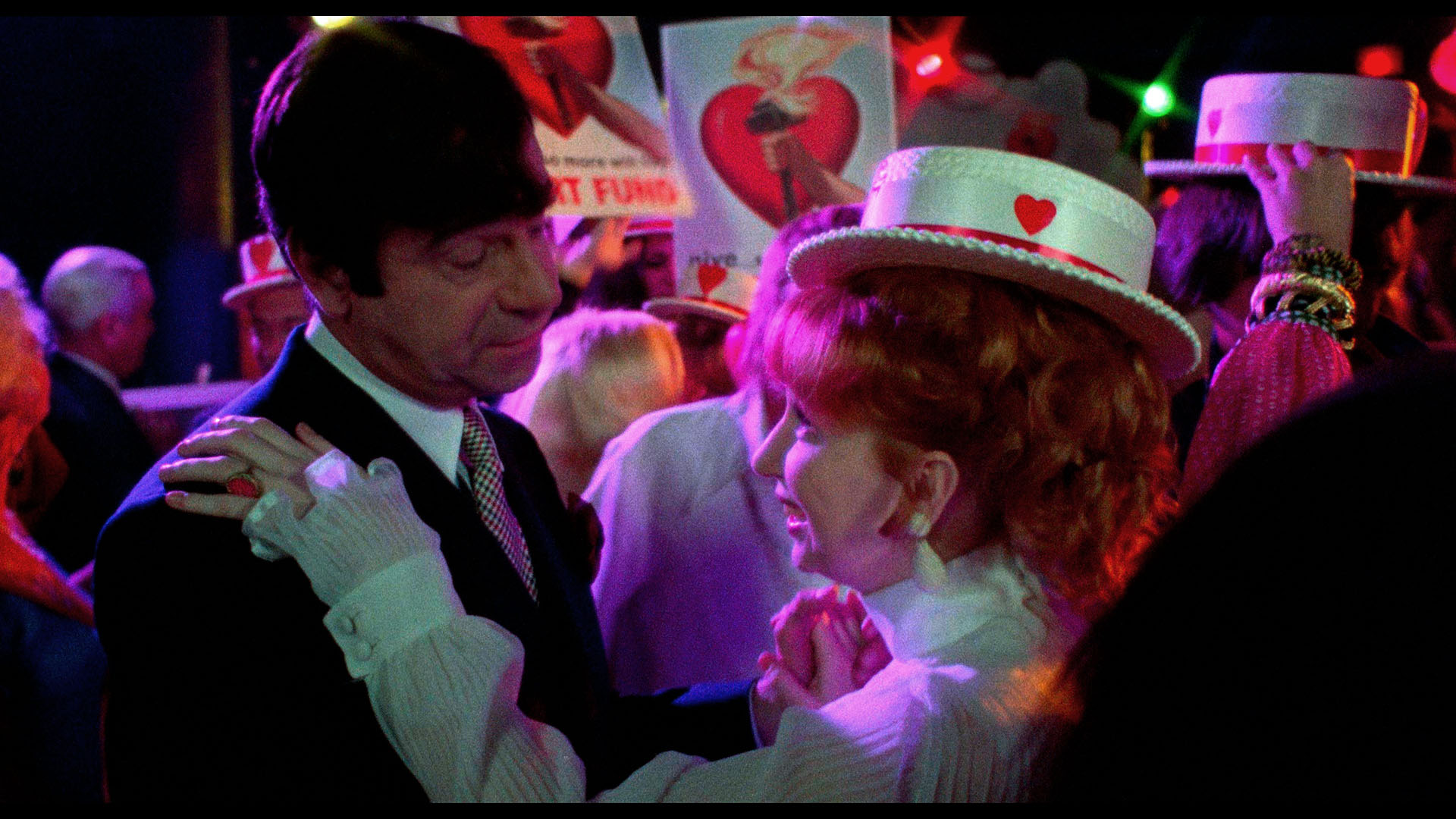 among the pantheon of young Hollywood filmmakers when she embarked on her directorial debut in 1970
among the pantheon of young Hollywood filmmakers when she embarked on her directorial debut in 1970  for Paramount. Based on a black comedy short story by crime fiction writer Jack Ritchie entitled "The Green Heart," A New Leaf started out as just a screenplay for May who ended up taking the reins as both director and actor out of necessity to preserve what she felt was the integrity of the project -- something that ended up earning a lot of industry press coverage when the budget and edited process far exceeded expectations. As a result, her initial, nearly completed three-hour cut ended up being taken away and shortened to 102 minutes, leading to her very vocal protests and an attempt to take her name off the film. The end result was still well received though, and the ensuing years have only elevated its status as one of the truly great 1970s comedies with both May and Walter Matthau (fresh off his very contentious experience with Hello, Dolly!) giving performances so note-perfect you can't imagine anyone else playing the roles.
for Paramount. Based on a black comedy short story by crime fiction writer Jack Ritchie entitled "The Green Heart," A New Leaf started out as just a screenplay for May who ended up taking the reins as both director and actor out of necessity to preserve what she felt was the integrity of the project -- something that ended up earning a lot of industry press coverage when the budget and edited process far exceeded expectations. As a result, her initial, nearly completed three-hour cut ended up being taken away and shortened to 102 minutes, leading to her very vocal protests and an attempt to take her name off the film. The end result was still well received though, and the ensuing years have only elevated its status as one of the truly great 1970s comedies with both May and Walter Matthau (fresh off his very contentious experience with Hello, Dolly!) giving performances so note-perfect you can't imagine anyone else playing the roles. 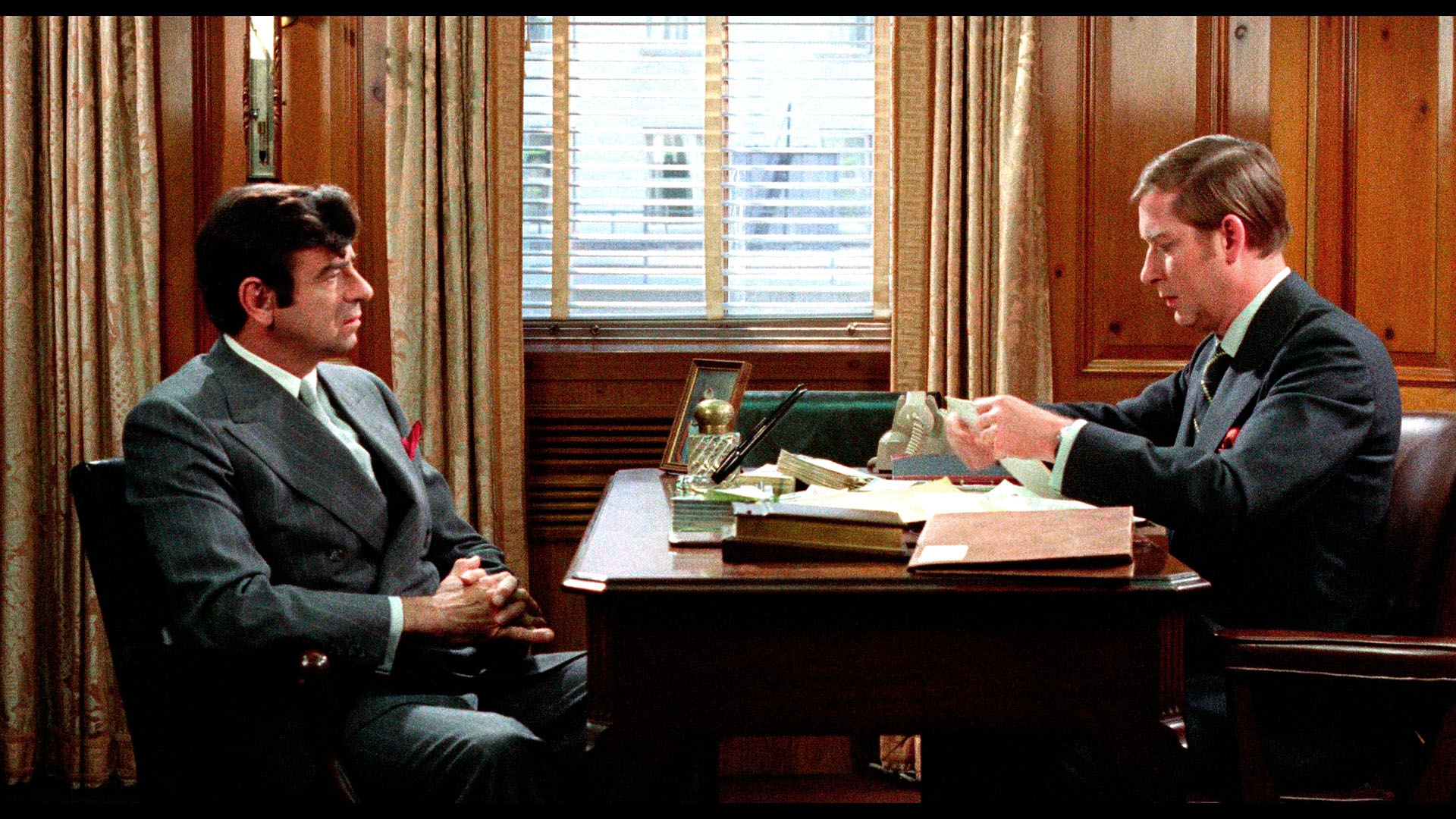 passes for "love" in a standard romantic comedy. Matthau was already specializing in playing irredeemable characters you still love to watch anyway (The Fortune Cookie probably being the closest comparison here), and that approach feels entirely fresh here in the context of May's endearing Henrietta, a character unlike anyone we'd really seen in a movie to that point. It's also quite a brutal takedown of the consequences of hoarded wealth resulting in hollow offspring, leading down a path that would normally seem like a happy ending but feels more
passes for "love" in a standard romantic comedy. Matthau was already specializing in playing irredeemable characters you still love to watch anyway (The Fortune Cookie probably being the closest comparison here), and that approach feels entirely fresh here in the context of May's endearing Henrietta, a character unlike anyone we'd really seen in a movie to that point. It's also quite a brutal takedown of the consequences of hoarded wealth resulting in hollow offspring, leading down a path that would normally seem like a happy ending but feels more 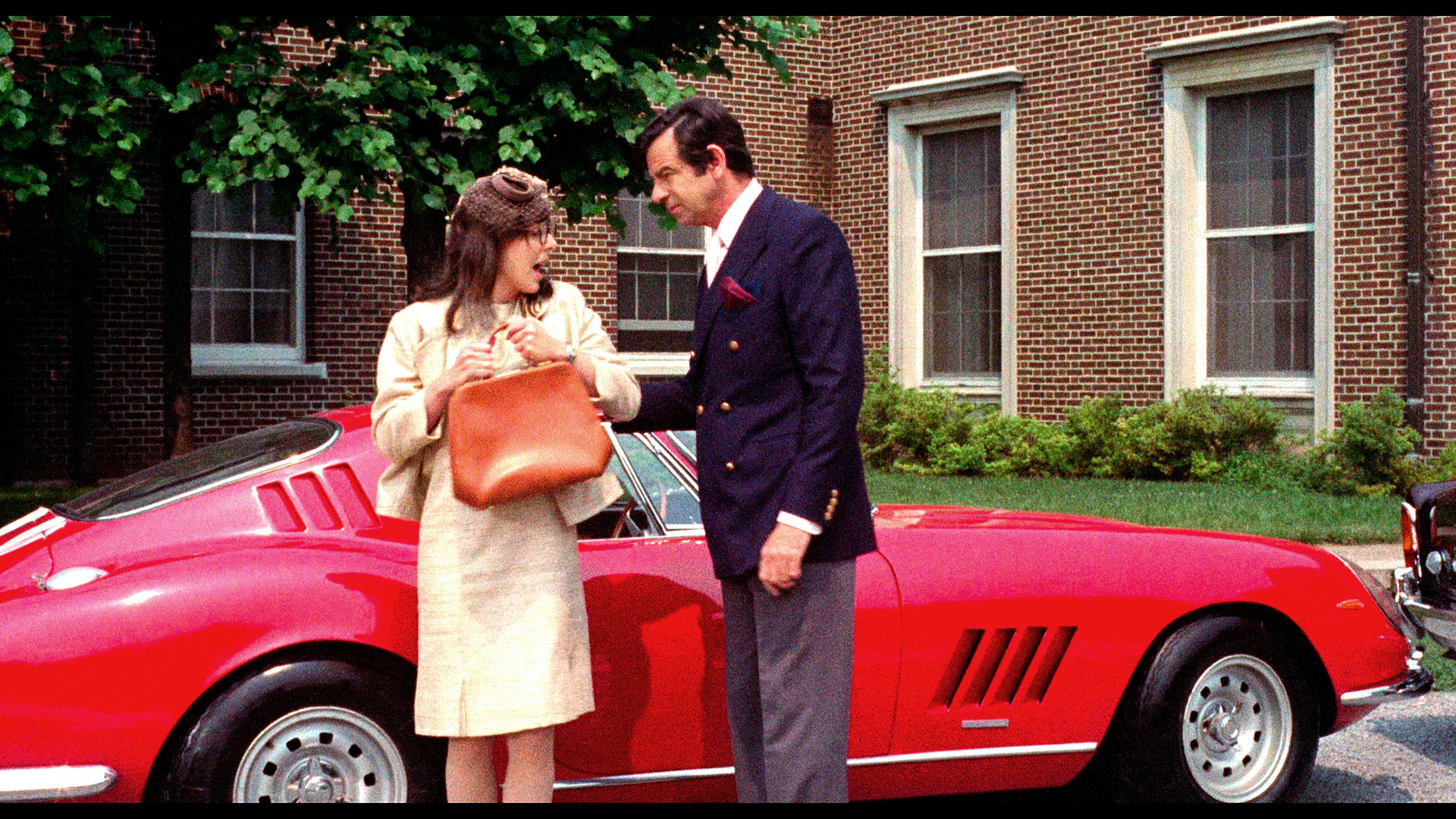 akin to another film shot almost simultaneously, Something for Everyone.
akin to another film shot almost simultaneously, Something for Everyone. this film that resonate with her. The terrible theatrical trailer is also included (no wonder the film initially underperformed), plus a text essay by Alexandra Heller-Nicholas ("Ode on a Grecian Nightgown") included both as a video feature and an inclusion in the insert booklet for some reason (plus the original short story).
this film that resonate with her. The terrible theatrical trailer is also included (no wonder the film initially underperformed), plus a text essay by Alexandra Heller-Nicholas ("Ode on a Grecian Nightgown") included both as a video feature and an inclusion in the insert booklet for some reason (plus the original short story).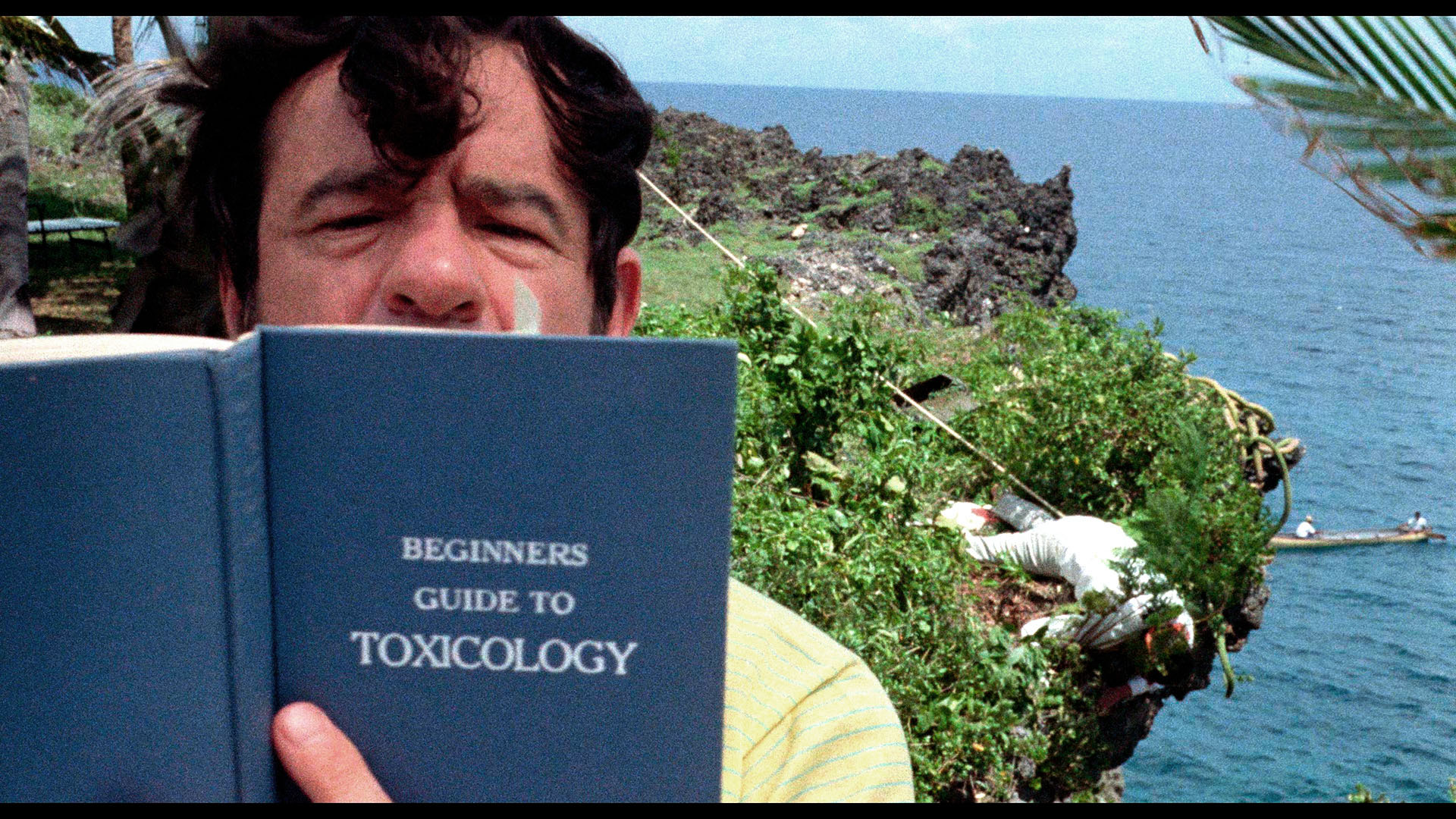 2025, Vinegar Syndrome imprint Cinématographe released a big upgrade across the board as a UHD and Blu-ray set with the usual elaborate, impressive packaging featuring a fold-out poster with art by cartoonist Michael DeForge and a thick booklet with essays by Sarah Fensom, Elena Lazic, Willow Catelyn Maclay, and Hannah Strong plus an archival one by Richard Brody. Together they form a thorough study of the film including its studio issues including casting, the ultimate advantages of Matthau's displeasure being on the set, and ways to read its approach to comedy and what the current cut still manages to slip under the radar. The new 4K scan (with HDR10-compatible Dolby Visino on the UHD) improves quite visibly over the two prior Blu-ray presentations with much punchier and healthier colors as well as finer details for hair, foliage, etc. The DTS-HD MA 2.0 English mono track sounds excellent as well and features optional English SDH subtitles. Here Smukler returns for a new track joined by K.J. Relth-Miller, and it's a better recorded track providing an insightful and engaging chronicle of how the film came to be, what made May a singular voice at the time, and the role it served at a key point in the evolution of American cinema and how it treated the roles of men and women. In "Director Jail" (22m30s), Carrie Courogen, author of Miss May Does Not Exist: The Life and Work of Elaine May, Hollywood’s Hidden Genius, recounts how she became drawn to May and explores how the reclusive artist's work has often been misunderstand or underestimated all the way through Ishtar. In "Looking for Elaine May" (14m53s), Heller-Nicholas talks about the reception to May and her films as well as her reticent approach to making movies divorced from the usual motives. A 2006 conversation with May and Nichols Film at Lincoln Center's Walter Reade Theater (69m3s) is a great chat between the friends and colleagues, starting off with a great point about Ishtar and then delivering a slew of stories and lessons from their careers together and apart as they dealt with the whims of studios under different regimes. Then you get an episode of the American Film Institute's Silver Streams podcast (48m22s) from 2021 running down all the essentials of this film as well as May's work as a director and a screenwriter (credited or not). The Corrao and Heckerling featurettes and trailer from the prior release are included here as well.
2025, Vinegar Syndrome imprint Cinématographe released a big upgrade across the board as a UHD and Blu-ray set with the usual elaborate, impressive packaging featuring a fold-out poster with art by cartoonist Michael DeForge and a thick booklet with essays by Sarah Fensom, Elena Lazic, Willow Catelyn Maclay, and Hannah Strong plus an archival one by Richard Brody. Together they form a thorough study of the film including its studio issues including casting, the ultimate advantages of Matthau's displeasure being on the set, and ways to read its approach to comedy and what the current cut still manages to slip under the radar. The new 4K scan (with HDR10-compatible Dolby Visino on the UHD) improves quite visibly over the two prior Blu-ray presentations with much punchier and healthier colors as well as finer details for hair, foliage, etc. The DTS-HD MA 2.0 English mono track sounds excellent as well and features optional English SDH subtitles. Here Smukler returns for a new track joined by K.J. Relth-Miller, and it's a better recorded track providing an insightful and engaging chronicle of how the film came to be, what made May a singular voice at the time, and the role it served at a key point in the evolution of American cinema and how it treated the roles of men and women. In "Director Jail" (22m30s), Carrie Courogen, author of Miss May Does Not Exist: The Life and Work of Elaine May, Hollywood’s Hidden Genius, recounts how she became drawn to May and explores how the reclusive artist's work has often been misunderstand or underestimated all the way through Ishtar. In "Looking for Elaine May" (14m53s), Heller-Nicholas talks about the reception to May and her films as well as her reticent approach to making movies divorced from the usual motives. A 2006 conversation with May and Nichols Film at Lincoln Center's Walter Reade Theater (69m3s) is a great chat between the friends and colleagues, starting off with a great point about Ishtar and then delivering a slew of stories and lessons from their careers together and apart as they dealt with the whims of studios under different regimes. Then you get an episode of the American Film Institute's Silver Streams podcast (48m22s) from 2021 running down all the essentials of this film as well as May's work as a director and a screenwriter (credited or not). The Corrao and Heckerling featurettes and trailer from the prior release are included here as well. ![]()